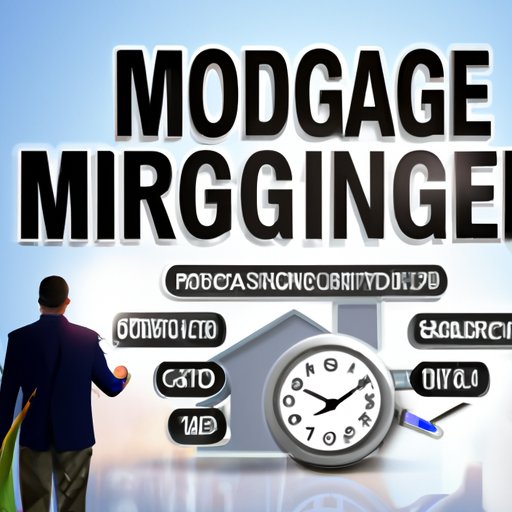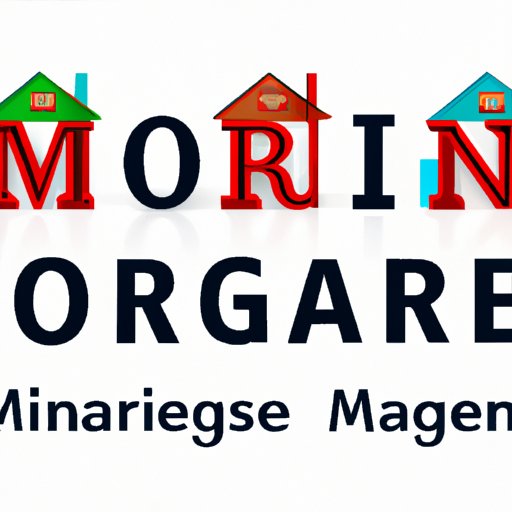
I. Introduction
Mortgage brokers play a critical role in the real estate industry by serving as the bridge between borrowers seeking home loans and lenders who can help them achieve their dreams of homeownership. If you’re passionate about helping others and interested in a dynamic and rewarding career, becoming a mortgage broker may be the perfect fit for you.
Not only is mortgage brokerage a desirable career path, but it also offers competitive salaries and a high degree of flexibility and independence. But where do you start? Read on for a step-by-step guide on how to become a mortgage broker and maximize your potential in the industry.
II. The Ultimate Guide to Becoming a Mortgage Broker: Step-by-Step Instructions
Before diving into the industry details, it’s essential to understand the education and licensing requirements for becoming a mortgage broker. The first step is to complete your high school education. You’ll need a diploma or GED equivalent before opting for higher education.
Next, you will need to complete a pre-licensing education course. The minimum requirement for pre-licensing education varies by state, but most states require 20-40 hours of coursework. The courses will cover federal and state laws, loan origination, appraisal, fraud, and ethics.
After completing coursework, you’ll need to pass a national exam, the Uniform State Test, to obtain your license. Some states may also have additional requirements and exams in addition to the National Mortgage Licensing System exam.
Once you pass the exam, you will be officially licensed to work as a mortgage broker. Different states may have additional requirements, so it’s best to check your state’s requirements before jumping in.
III. Breaking Into the Mortgage Broker Industry: What You Need to Know
After obtaining your license, the next step is to find a job as a mortgage broker. You can find plenty of job vacancies at traditional banks, credit unions, mortgage brokerage firms, or as an independent mortgage broker.
If you’re struggling to find a job, start by building a robust professional network and attending industry events to connect with other brokers, borrowers, and lenders. You may need to start as a loan officer or assistant and work your way up to become a broker.
Also, consider the pros and cons of working for an established mortgage brokerage firm versus becoming an independent mortgage broker. Independent brokers can offer a higher degree of flexibility, higher earning potential, and greater control over the mortgage process. However, working for a well-established firm can offer job security, guaranteed leads, and marketing support to help you grow your business.
IV. Maximizing Your Potential: Top Tips for Aspiring Mortgage Brokers
As an aspiring mortgage broker, it’s crucial to develop the skills required to thrive in the competitive industry.
One of the key skills that mortgage brokers need is active listening. Understanding your clients’ needs can make all the difference in whether you can match them with suitable lenders.
Next, focus on building a robust network of clients, referral sources, and industry connections. Join local real estate organizations, and develop relationships with real estate agents, lawyers, accountants, and financial planners.
Marketing plays a crucial role in growing your business. Consider digital marketing tools like SEO, content marketing, email marketing, and social media marketing to expand your reach and build your brand.
Finally, always stay informed of industry changes, trends, new loan products, and regulatory updates. Attend industry conferences and webinars, read industry publications and online forums, and join industry associations to stay ahead of the competition.
V. Inside Look: What It Takes to Be a Successful Mortgage Broker
To get an inside look at what it takes to become a successful mortgage broker, we interviewed several top brokers in the industry. They shared their insights and experiences on what separates successful and unsuccessful mortgage brokers.
The first major lesson they shared was the importance of putting clients’ needs first. Successful brokers listen to their clients and work on matching them with lenders who can provide affordable mortgage products and help them achieve their homeownership goals.
They also emphasized the importance of building strong professional networks and referral sources. Brokers that succeed in the industry have a loyal client base and a steady flow of business coming from their professional networks. They also highlighted the importance of staying up-to-date with the latest industry trends and attending educational workshops and training events regularly.

VI. From A to Z: Building a Successful Career in Mortgage Brokerage
Building a successful career in mortgage brokerage takes time and effort. We’ve compiled a roadmap for developing a successful career as a mortgage broker, including tips on expanding your business and increasing your income.
The first step is to invest in your knowledge and skills through continuous education and professional development. Attend industry events, training programs, and seminars to keep your skills updated and learn new skills that can help you stay ahead in the industry.
Next, focus on networking. Building a strong network of real estate professionals, including agents, lawyers, and accountants, can help you build a solid referral network. Your referral network can be a crucial source of business in the early years of your career when building a client base can be challenging.
Another critical aspect of building a successful career in mortgage brokerage is investing in marketing and branding. Develop a comprehensive marketing strategy that includes a professional website, social media platforms, and digital marketing tools to promote your services, expand your reach, and build your brand.
Finally, to increase your income and expand your business, consider branching out into other mortgage-related services, such as financial advisory services, insurance, or appraisals. Develop a business model that incorporates your core brokerage services as well as complementary services to offer your clients a one-stop-shop for all their mortgage needs.
VII. Confessions of a Mortgage Broker: Lessons Learned and Keys to Success
Lastly, we spoke with experienced mortgage brokers to learn from their experiences. They provided invaluable insights and advice on how to avoid common pitfalls and mistakes and succeed in the industry.
One of the key pieces of advice they shared was the importance of building a reliable support system, including mentors, colleagues, and industry associations. They also advised new brokers to develop an entrepreneurial mindset and focus on developing a client-first approach to build their businesses.
VIII. The Road to Becoming a Mortgage Broker: Pitfalls to Avoid and Strategies for Growth
When starting your career as a mortgage broker, it’s essential to avoid common pitfalls that can derail your success and growth. Some common mistakes include not investing in marketing and personal branding, failing to maintain regulatory compliance, and not networking effectively.
To overcome these challenges, focus on building a robust business plan that includes developing comprehensive marketing strategies, maintaining regulatory compliance, developing a strong network, and continuous education and professional development.
IX. Conclusion
Becoming a mortgage broker is a desirable career with tremendous opportunities for growth and success. With a commitment to lifelong learning and professional development, a client-first approach, building a strong network, and effective marketing and branding, you can build a successful career as a mortgage broker.
The road to becoming a mortgage broker may have its challenges, but with dedication, hard work, and the strategies outlined in this guide, you’ll be well on your way to a fulfilling and lucrative career in the mortgage brokerage industry.




